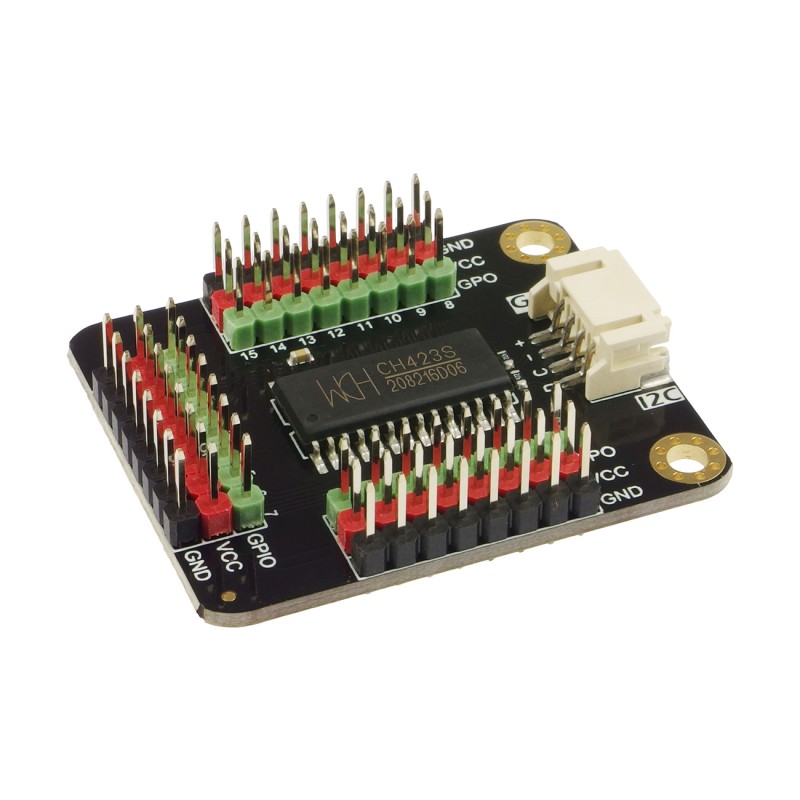







A 24-channel input/output port expander module controlled via I2C interface. It is based on the CH423 chip. E8 ports can operate as inputs/outputs and 16 only as outputs. The maximum output current should not exceed 15 mA, and the pins are compatible with 3.3 V and 5 V. The expander will prove useful for LED lighting or matrix display projects. Full documentation is available on the product wiki page.
Manufacturer BTC Korporacja sp. z o. o. Lwowska 5 05-120 Legionowo Poland sprzedaz@kamami.pl 22 767 36 20
Responsible person BTC Korporacja sp. z o. o. Lwowska 5 05-120 Legionowo Poland sprzedaz@kamami.pl 22 767 36 20
Expansion board for Arduino, allows easy connection of XBee modules, has separate outputs for I2C, SPI and UART buses. The built-in 3.3V voltage stabilizer and operating mode switch make it easier to program the Arduino when the XBee module is connected to the sockets. DFRobot DFR0265
A set of 10 cables, 30 cm long, compliant with the Gravity standard. DFRobot FIT0513
Measurement module with RS485 interface. It has two voltage measurement inputs in the range of 0 to 5 V and 0 to 10 V and two current measurement inputs in the range of 0 to 20 mA. Supports the Modbus RTU protocol
8-channel I2C expander module based on the PCA9548 chip. Allows communication with multiple I2C devices that have the same address. Equipped with STEMMA QT connectors. Adafruit 5626
An 4-channel I2C expander module, which is based on the TCA9546A chip. It allows connecting several devices with the same address to a single I2C interface. Adafruit 5664
DAQ device based on Ethernet communication and equipped with 24 digital inputs/outputs and a counter input. It allows you to control devices via the Internet. Digilent 6069-410-052
No product available!
8-channel IO expander with 6 analog inputs. It communicates via the USB interface. Version without Pull-Up resistors. Numato Lab GP80001
Compact module that allows easy changing of I2C sensor addresses, allowing coexistence of multiple devices with the same address on one bus. With DIP switches and optional soldering resistors, users can easily configure sensor addresses without having to modify the code or use external components. DFRobot DFR1185
A versatile expander supported by the I2C interface, which significantly expands the capabilities of microcontrollers and microcomputers. It is based on the ATSAMD09 microcontroller and comes with default software that can be modified to suit the needs of the project. Adafruit 3657
KAmod I2C Hub8 enables splitting the I2C bus into eight independent channels with a voltage translation function, which allows effective integration of multiple devices with repeating addresses. The module is recommended for advanced microprocessor projects with bus separation requirements and diverse voltage levels.
16-channel IO expander with 7 analog inputs. It communicates via the USB interface. Numato Lab GP160001
32-channel IO expander with 7 analog inputs. It communicates via the USB interface. Enclosure included. Numato Lab GP320001E
Module with 16-channel I/O ports expander controlled by the I2C interface. It was based on the MCP23017 chip
8-channel solenoid driver controlled via I2C. Compatible with 3V/5V logic, features STEMMA QT / Qwiic connectors. Adafruit 6318
No product available!
16-channel PoE GPI/GPO module enabling connection of a PC to other electronic circuits via a network. It does not need a separate cable for power and data transmission. It can be controlled via a simple web interface or Telnet. Numato Lab NLGP1001-A
No product available!
8-channel IO expander with 6 analog inputs with 10-bit resolution. Communicates via USB interface. It has compact dimensions, making it suitable for small devices. Numato Lab GP80002
No product available!
4-channel PCIe port expander. It can be powered with 12 V via a PCIe connector or an external DC connector. Waveshare PCIe-Packet-Switch-4P

A 24-channel input/output port expander module controlled by an I2C interface. It was based on the CH423 chip and equipped with a Gravity connector. DFRobot DFR0979
